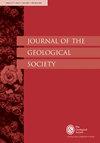Seve Nappe杂岩北部新元古代上部片麻岩单元的奥陶纪-志留纪变形:对Baltican边缘俯冲的影响
IF 2.6
3区 地球科学
Q2 GEOSCIENCES, MULTIDISCIPLINARY
引用次数: 0
摘要
上部片麻岩单元暴露在斯堪的纳维亚喀里多尼亚山脉最北端的Seve Nappe杂岩(SNC)中。为了研究该单元的加里东构造史,对一个隐色花岗岩和两个副片麻岩应用了原位白云母和黑云母40Ar/39Ar地质年代学。浅色花岗岩表现出低应变特征。黑云母斑晶的冷却年龄为459±2 Ma。取代黑云母和斜长石的白云母的结晶年龄为436±5 Ma。两种副片麻岩中的白云母都表现出与顶部到E剪切感相关的高应变特征。一个副片麻岩提供了分散的晚寒武纪至晚奥陶世日期,最年轻的近似变形为459±2 Ma。较老的日期被解释为反映了从以前的变质事件中继承的40 Ar。第二副片麻岩的变形年龄为434±2 Ma。集体数据集被解释为记录:1)约459 Ma时上部片麻岩单元的剥露,2)大陆碰撞期间约434 Ma时的变形和流体渗透。这些事件与其他北SNC地体的变形历史非常相似。将这些结果与其他北SNC地体综合起来表明,巴尔蒂坎边缘在寒武纪晚期经历了倾斜的南北俯冲。主题收藏:本文是Caledonian Wilson周期收藏的一部分,可在以下网站上获得:https://www.lyellcollection.org/topic/collections/the-caledonian-wilson-cycle补充材料:https://doi.org/10.6084/m9.figshare.c.6639993本文章由计算机程序翻译,如有差异,请以英文原文为准。
Ordovician-Silurian deformation of the Neoproterozoic upper gneiss unit in the northern Seve Nappe Complex: Implications for subduction of the Baltican margin
The upper gneiss unit is exposed in the northernmost Seve Nappe Complex (SNC) in the Scandinavian Caledonides. To investigate the Caledonian tectonic history of the unit,
in-situ
white mica and biotite
40
Ar/
39
Ar geochronology was applied to a leucogranite and two paragneisses. The leucogranite exhibits low strain traits. Biotite porphyroblasts yielded a cooling age of 459 ± 2 Ma. White mica that replace biotite and plagioclase provided a crystallization age of 436 ± 5 Ma. White mica in both paragneisses exhibit high strain characteristics associated with top-to-E sense of shear. One paragneiss provided dispersed late Cambrian to Late Ordovician dates with the youngest approximating deformation at 459 ± 2 Ma. The older dates are interpreted to reflect
40
Ar inherited from a previous metamorphic event. The second paragneiss yielded a deformation age of 434 ± 2 Ma. The collective dataset is interpreted to record: 1) exhumation of the upper gneiss unit at c. 459 Ma, 2) deformation and fluid-infiltration at c. 434 Ma during continental collision. The events closely resemble the deformation histories of other northern SNC terranes. Synthesizing these results with other northern SNC terranes suggests that the Baltican margin underwent oblique, south-to-north subduction during late Cambrian time.
Thematic collection:
This article is part of the Caledonian Wilson cycle collection available at:
https://www.lyellcollection.org/topic/collections/the-caledonian-wilson-cycle
Supplementary material:
https://doi.org/10.6084/m9.figshare.c.6639993
求助全文
通过发布文献求助,成功后即可免费获取论文全文。
去求助
来源期刊

Journal of the Geological Society
地学-地球科学综合
CiteScore
6.00
自引率
3.70%
发文量
68
审稿时长
6-12 weeks
期刊介绍:
Journal of the Geological Society (JGS) is owned and published by the Geological Society of London.
JGS publishes topical, high-quality recent research across the full range of Earth Sciences. Papers are interdisciplinary in nature and emphasize the development of an understanding of fundamental geological processes. Broad interest articles that refer to regional studies, but which extend beyond their geographical context are also welcomed.
Each year JGS presents the ‘JGS Early Career Award'' for papers published in the journal, which rewards the writing of well-written, exciting papers from early career geologists.
The journal publishes research and invited review articles, discussion papers and thematic sets.
 求助内容:
求助内容: 应助结果提醒方式:
应助结果提醒方式:


